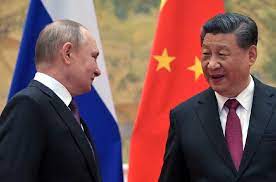Dr. Diana Galeeva
In literature, the term “epistolary novel” refers to a work of fiction written in the form of letters or other documents. On the eve of the recent meeting between the leaders of China and Russia in Moscow, the heads of both states wrote articles for newspapers in each other’s countries.
Russian President Vladimir Putin’s piece was published in Jenmin Jibao (People’s Daily), and Chinese President Xi Jinping’s in the Rossiyskaya Gazeta (Russian Gazette).
I believe we can apply the epistolary concept to analyzing the discourses by the leaders of the two states in these articles, which can be seen as letters to the peoples of both nations as well as to the world. I will focus on “diplomatic epistolary” to explain why Xi was in Moscow and what rationale this reveals in Russian-Chinese relations.
Of his expectations for the meeting with Xi in Russia, Putin noted that they had already met about 40 times and that Russia associated “great expectations” with the visit of the Chinese leader.
“This is also a great opportunity for me to see a good old friend with whom we have the warmest relationship,” he wrote.
According to Putin, relations between the two countries “have reached the highest level in their entire history and continue to grow stronger.”
More specifically, in terms of bilateral relations, by the end of 2022, trade between the two countries had doubled, he said, and reached $185 billion, which is a new record. Russia now expects it to pass the $200 billion mark not in 2024 — as previously predicted — but this year, while the share of settlements in national currencies is growing and relations “are becoming even more sovereign.”
The Power of Siberia gas pipeline is, Putin said, “without exaggeration” the “deal of the century,” while the volumes of oil and coal supplied by Russia to China have increased. In 2022, two bridge crossings between Russia and China were built in border regions across the Amur River.
On geopolitics, Putin said that Russia, China and their allies stand for “the formation of a world order based on international law” and not on certain “rules” that serve the needs of the “golden billion.” He considers the Chinese “Global Security Initiative” to be consistent with Russian approaches.
The Russian president also highlighted the US declarations of Russia as an “immediate threat” and China as a “strategic competitor.”
Putin expressed gratitude to China for its “balanced line in connection with the events taking place in Ukraine, for understanding their background and real reasons.” He welcomed the willingness of Beijing to play a “constructive role in resolving the crisis.”
Regarding Western activities in the Asia-Pacific region, he said NATO was trying to “give its activities a global scope.” He expressed his belief that “some forces are persistently striving to split the common Eurasian space into a network of ‘exclusive clubs’ and military blocs” but added that “no one will be able to achieve this.”
Xi wrote that his visit to Russia was “aimed at strengthening friendship, cooperation, and peace” and noted that during his meetings with the Russian leader they “set the tone for the sustainable development of bilateral relations.”
He said that Russia and China both adhere to the concept of “eternal friendship and mutually beneficial cooperation” and relations between the countries are based on the principles of “non-alignment, non-confrontation, and non-direction against third parties.”
The bilateral relationship serves as “a standard of interstate relations of a new type,” according to Xi, and “multipolarity, economic globalization and the democratization of international relations” is an “irreversible trend.”
Beijing’s previously announced plan for resolving the conflict between Russia and Ukraine “reflects to the maximum the unity of the world community’s views on overcoming the Ukraine crisis,” the Chinese leader said.
These letters are illustrative, firstly, of the close ties between the two leaders, who consider themselves “good old friends” with the “warmest relationship.” On the issue of bilateral relations, the “unlimited” partnership that was declared in a joint statement on Feb. 4, 2022, will continue, as China described these relations as being at a “historic high.” This is not a formal alliance but surely represents a close strategic partnership — geopolitically, economically, militarily, and politically.
Secondly, after emerging as the most “sensational” mediator in the Middle East, brokering the recent rapprochement between Saudi Arabia and Iran, Beijing might be heading toward another diplomatic victory by potentially brokering peace between Russia and Ukraine, after suggesting a 12-point plan to end the conflict.
During the Munich Security Conference, US Secretary of State Antony Blinken expressed concerns when he met his Chinese counterpart, Wang Yi. “The secretary was quite blunt in warning about the implications and consequences of China providing material support to Russia or assisting Russia with systematic sanctions evasion,” officials said.
Wang nonetheless stated that China would be introducing a “peace plan” for Ukraine and Russia, in addition to maintaining relations with Europe.
Overall, these letters to the world reveal a clear message that peace negotiations will probably take place under Beijing’s aegis in the short term, and relations between Russia and China will be maintained at their “highest” levels in the medium term.
According to the philosopher Confucius: “Politics should be beautiful.” To what extent this partnership between China and Russia will turn out to be “beautiful,” and to what extent the messages from the two leaders form a “diplomatic epistolary,” remains to be seen.







